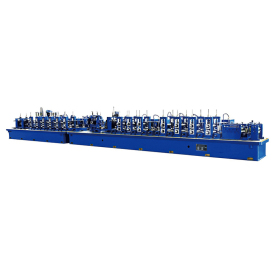[Pipe making machine]The Ultimate Guide to Understanding Pipe Making Machines: Revolutionizing the Manufacturing of Tubing and Piping Solutions
News 2024-8-7
In today's modern manufacturing landscape, efficiency and precision are key components in producing quality products that meet the demands of various industries. Among the diverse array of manufacturing technologies, pipe making machines stand out as essential not only for their functionality but also for the innovation they introduce into the world of piping solutions. This article delves into the intricacies of pipe making machines, exploring their types, applications, and the advantages they bring to manufacturers.
What is a Pipe Making Machine?
A pipe making machine is a specialized piece of equipment designed to manufacture pipes, tubes, and various forms of tubing from different raw materials such as metals, plastics, and composites. These machines employ a combination of high-speed processes, cutting-edge technology, and precision engineering to produce pipes of various sizes and shapes efficiently.

The Ultimate Guide to Understanding Pipe Making Machines: Revolutionizing the Manufacturing of Tubing and Piping Solutions
Types of Pipe Making Machines

The Ultimate Guide to Understanding Pipe Making Machines: Revolutionizing the Manufacturing of Tubing and Piping Solutions
1. **ERW (Electric Resistance Welded) Pipe Making Machines**: These machines produce pipes by rolling flat strips of metal into a cylindrical shape and then welding the edges together using electric resistance methods. ERW pipes are commonly used in oil and gas, construction, and automotive applications.
2. **Seamless Pipe Making Machines**: Seamless pipes are created through processes such as extrusion or rotary piercing, which eliminate the need for seams. This type of pipe is preferred for high-pressure applications and tends to have superior strength and durability.
3. **Spiral Pipe Making Machines**: These machines manufacture spiral pipes by continuously winding a flat strip of metal or other materials into a spiral shape. This design is popular for large-diameter pipes and is often used in the construction of water and sewage systems.
4. **Plastic Pipe Making Machines**: Using processes such as extrusion, these machines produce pipes from various types of plastics, including PVC, HDPE, and PP. Plastic pipe manufacturing has seen significant growth due to its lightweight and corrosion-resistant properties.
5. **CNC Pipe Bending Machines**: While not pipe making machines in the traditional sense, CNC (Computer Numerical Control) machines are crucial in the secondary processes of pipe manufacturing. They allow for the precise bending and shaping of piping systems for unique applications.
Applications of Pipe Making Machines

The Ultimate Guide to Understanding Pipe Making Machines: Revolutionizing the Manufacturing of Tubing and Piping Solutions
- **Construction**: Pipes are vital for plumbing, drainage, and structural applications. - **Oil and Gas**: Durable pipes are essential for transporting oil and gas over long distances. - **Automotive**: Pipes are used in exhaust systems, fuel lines, and other automotive components. - **Agriculture**: Irrigation systems often depend on high-quality pipes for efficient water distribution. - **Telecommunications**: Fiber optic and electrical cables are often housed within specialized tubes and conduits.
Advantages of Pipe Making Machines
Investing in pipe making machines can bring a plethora of advantages to manufacturers, including:
- **Increased Production Efficiency**: Automated machines can operate at high speeds, significantly increasing output while maintaining precision. - **Cost Reduction**: By reducing waste and minimizing labor costs, manufacturers can lower overall production expenses. - **Consistency and Quality**: High-quality machines implement strict tolerances, ensuring that every pipe meets industry standards without defects. - **Flexibility**: Many modern machines can switch between different product types and sizes, allowing for versatile production capabilities. - **Reduced Lead Times**: Fast production cycles mean that manufacturers can fulfill orders more quickly, improving customer satisfaction.
Conclusion
As industries continue to evolve, the importance of advanced manufacturing solutions such as pipe making machines becomes increasingly clear. These machines not only enhance production efficiency but also uphold the quality standards necessary in a competitive market. By understanding the types, applications, and advantages of pipe making machines, manufacturers can better navigate the complexities of their supply chains while ensuring a strong foothold in their respective industries. As we look to the future, it's evident that the evolution of pipe making technology will further contribute to the ongoing advancements in manufacturing and construction processes worldwide.
